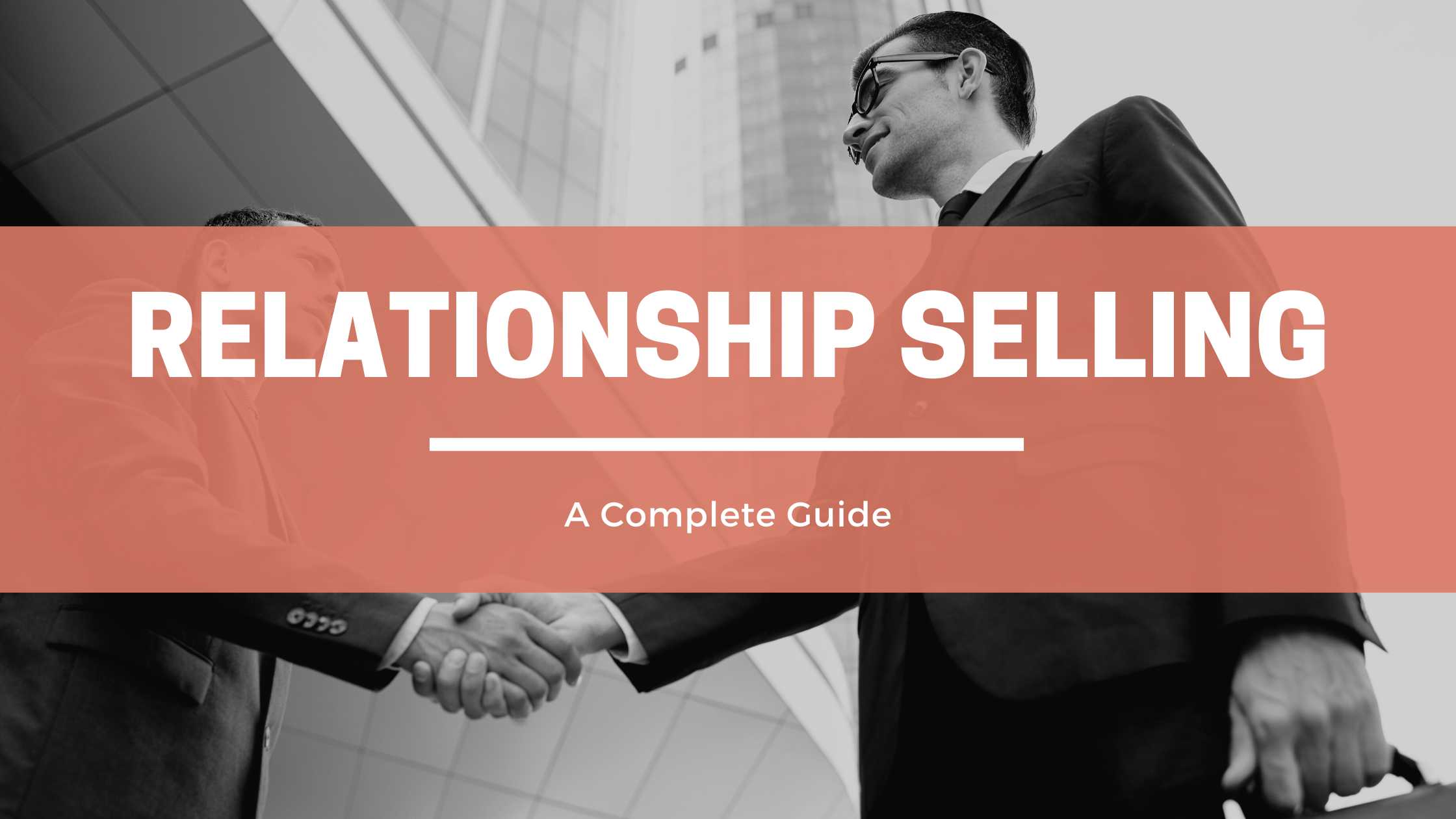In today’s competitive business landscape, building strong, long-term relationships with customers is more important than ever. That’s where relationship selling comes in.
What is relationship selling ?
Relationship selling is a sales approach that focuses on building long-term relationships with customers rather than just making a one-time sale. The goal of relationship selling is to create a loyal customer base that will continue to purchase from a company over time.
What is relationship selling used for?
Relationship selling is used in a variety of industries and contexts, including business-to-business (B2B) sales, business-to-consumer (B2C) sales, and even in non-profit organizations.
What is an example of relationship selling ?
An example of relationship selling might be a salesperson who works with a customer to understand their needs and preferences, and then provides them with personalized recommendations or solutions that meet their specific requirements. This salesperson may also work to build a rapport with the customer, establish trust, and provide ongoing support and assistance throughout the customer’s relationship with the company.
What is the history of relationship selling ?
The history of relationship selling can be traced back to the early days of commerce, when merchants and customers often had long-standing relationships and transactions were based on trust and personal connections. As commerce has evolved, the concept of relationship selling has remained an important aspect of successful sales strategies, although the ways in which it is implemented may have changed.
What is the importance of relationship selling ?
The importance of relationship selling lies in its ability to create long-term value for both the seller and the customer. By building strong, ongoing relationships with customers, a company can foster loyalty and repeat business, which can lead to increased sales and profits.
What is the benefit of relationship selling ?
There are several benefits to using a relationship selling approach, including:
- Increased customer satisfaction: By focusing on the needs and preferences of individual customers, relationship selling can lead to higher levels of customer satisfaction, which can in turn lead to repeat business and positive word-of-mouth referrals.
- Improved customer retention: Building strong relationships with customers can help a company retain them over the long term, reducing the need to constantly attract new customers.
- Increased credibility: By establishing trust and credibility with customers, a company can differentiate itself from its competitors and gain a competitive advantage.
What is the disadvantage of relationship selling ?
One potential disadvantage of relationship selling is that it can require more time and effort on the part of the salesperson, as building and maintaining relationships with customers can be a ongoing process. Additionally, there may be costs associated with providing ongoing support and assistance to customers.
What are the principles of relationship selling?
There are several principles that are commonly associated with relationship selling:
- Building trust: Trust is a key component of any successful relationship, and it is especially important in the context of sales. Salespeople who are able to build trust with their customers are more likely to be successful in the long term.
- Listening to the customer: Relationship selling involves actively listening to the customer’s needs and concerns in order to understand their requirements and provide personalized solutions.
- Providing value: Relationship selling involves offering value to the customer beyond just the product or service being sold. This can include providing ongoing support and assistance, offering additional resources or information, or simply being available to answer questions or address concerns.
- Fostering ongoing communication: Maintaining ongoing communication with customers is important for building and maintaining relationships. This can involve regular check-ins, updates on new products or services, or simply staying in touch to ensure that the customer’s needs are being met.
What is relationship selling framework?
A relationship selling framework is a set of guidelines or principles that a salesperson can follow in order to build and maintain relationships with customers. There are many different relationship selling frameworks that have been developed, but they typically involve a set of steps that a salesperson can follow in order to effectively build and maintain relationships with customers.
What are the steps for relationship selling ?
The specific steps in a relationship selling process may vary depending on the specific context, but some common steps might include:
- Identifying potential customers and building a rapport with them
- Understanding the customer’s needs and preferences
- Providing personalized solutions or recommendations
- Establishing trust and credibility with the customer
- Maintaining ongoing communication and providing ongoing support and assistance
What is the decision process in relationship selling?
The decision process in relationship selling involves helping the customer make an informed decision about whether to purchase a product or service. This may involve providing the customer with information about the product or service, answering their questions, addressing any concerns they may have, and helping them understand how the product or service will meet their needs. Ultimately, the goal is to help the customer make a decision that is in their best interests, while also ensuring that the company’s needs are met.
Is relationship selling still relevant?
Yes, relationship selling is still relevant today. In fact, in many industries, building strong relationships with customers is more important than ever, as customers have more options and are often more discerning about who they choose to do business with.
What are relationship selling techniques?
Some relationship selling techniques that salespeople may use include:
- Building rapport: Establishing a personal connection with the customer can be an important part of building a successful relationship. This can involve finding common ground, showing genuine interest in the customer, and establishing a sense of trust and credibility.
- Listening actively: Relationship selling involves actively listening to the customer’s needs and concerns in order to understand their requirements and provide personalized solutions.
- Providing value: Relationship selling involves offering value to the customer beyond just the product or service being sold. This can include providing ongoing support and assistance, offering additional resources or information, or simply being available to answer questions or address concerns.
- Maintaining ongoing communication: Staying in touch with customers and maintaining ongoing communication is important for building and maintaining relationships. This can involve regular check-ins, updates on new products or services, or simply staying in touch to ensure that the customer’s needs are being met.
Is relationship selling a skill?
Relationship selling is definitely a skill, and it is one that can be developed and improved upon with practice.
What are the important skills to know in relationship selling?
Some important skills to know in relationship selling include:
- Communication: Being able to communicate effectively with customers is crucial for building and maintaining relationships. This includes listening actively, speaking clearly and concisely, and being able to adapt your communication style to the needs of the customer.
- Empathy: Being able to understand and relate to the needs and concerns of the customer is an important part of relationship selling.
- Problem-solving: Relationship selling often involves helping the customer find solutions to their problems or needs, so being able to identify and solve problems is an important skill.
- Time management: Building and maintaining relationships with customers can be time-consuming, so being able to manage your time effectively is important for success in relationship selling.
How to learn relationship selling
There are several ways to learn relationship selling, including:
- On-the-job training: Many companies provide training programs or resources to help salespeople learn relationship selling skills. This can include training on communication skills, customer service, and other relevant topics.
- Books and online resources: There are many books and online resources available that can help salespeople learn relationship selling skills. These resources may include case studies, best practices, and other useful information.
- Courses and training programs: There are also many courses and training programs available that focus specifically on relationship selling. These programs can provide in-depth training on the principles and practices of relationship selling.
How to ask questions on relationship selling
To ask questions on relationship selling, it can be helpful to focus on specific topics or areas of interest. For example, you might ask about the best ways to build trust with customers, or about effective strategies for maintaining ongoing communication. You could also ask about common challenges or pitfalls to avoid when using a relationship selling approach.
What is the difference between relationship and strategic selling?
The difference between relationship selling and strategic selling is that relationship selling focuses on building long-term relationships with customers, while strategic selling involves developing a customized sales approach for each individual customer based on their specific needs and goals. In strategic selling, the salesperson works closely with the customer to understand their business and develop a customized solution that meets their needs. Relationship selling may be a part of the strategic selling process, but it is not the primary focus.

